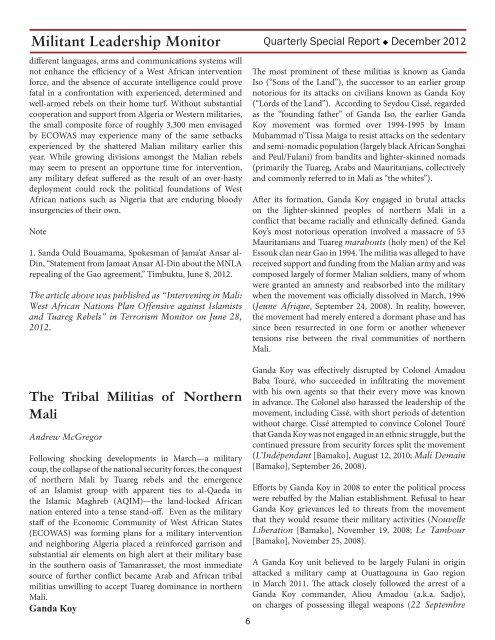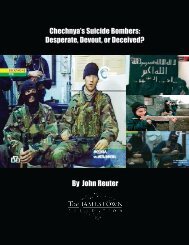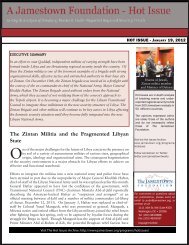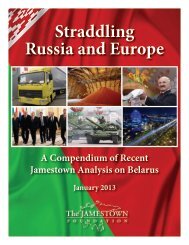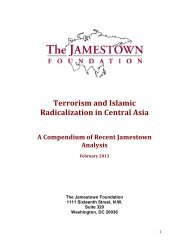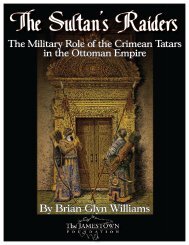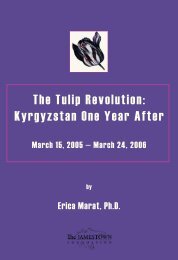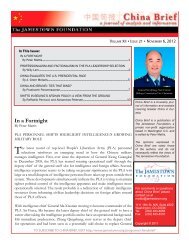Mayhem in Mali:A Militant Leadership Monitor Special Report
Mayhem in Mali:A Militant Leadership Monitor Special Report
Mayhem in Mali:A Militant Leadership Monitor Special Report
You also want an ePaper? Increase the reach of your titles
YUMPU automatically turns print PDFs into web optimized ePapers that Google loves.
<strong>Militant</strong> <strong>Leadership</strong> <strong>Monitor</strong> Quarterly <strong>Special</strong> <strong>Report</strong> u December 2012<br />
different languages, arms and communications systems will<br />
not enhance the efficiency of a West African <strong>in</strong>tervention<br />
force, and the absence of accurate <strong>in</strong>telligence could prove<br />
fatal <strong>in</strong> a confrontation with experienced, determ<strong>in</strong>ed and<br />
well-armed rebels on their home turf. Without substantial<br />
cooperation and support from Algeria or Western militaries,<br />
the small composite force of roughly 3,300 men envisaged<br />
by ECOWAS may experience many of the same setbacks<br />
experienced by the shattered <strong>Mali</strong>an military earlier this<br />
year. While grow<strong>in</strong>g divisions amongst the <strong>Mali</strong>an rebels<br />
may seem to present an opportune time for <strong>in</strong>tervention,<br />
any military defeat suffered as the result of an over-hasty<br />
deployment could rock the political foundations of West<br />
African nations such as Nigeria that are endur<strong>in</strong>g bloody<br />
<strong>in</strong>surgencies of their own.<br />
Note<br />
1. Sanda Ould Bouamama, Spokesman of Jama’at Ansar al-<br />
D<strong>in</strong>, “Statement from Jamaat Ansar Al-D<strong>in</strong> about the MNLA<br />
repeal<strong>in</strong>g of the Gao agreement,” Timbuktu, June 8, 2012.<br />
The article above was published as “Interven<strong>in</strong>g <strong>in</strong> <strong>Mali</strong>:<br />
West African Nations Plan Offensive aga<strong>in</strong>st Islamists<br />
and Tuareg Rebels” <strong>in</strong> Terrorism <strong>Monitor</strong> on June 28,<br />
2012.<br />
The Tribal Militias of Northern<br />
<strong>Mali</strong><br />
Andrew McGregor<br />
Follow<strong>in</strong>g shock<strong>in</strong>g developments <strong>in</strong> March—a military<br />
coup, the collapse of the national security forces, the conquest<br />
of northern <strong>Mali</strong> by Tuareg rebels and the emergence<br />
of an Islamist group with apparent ties to al-Qaeda <strong>in</strong><br />
the Islamic Maghreb (AQIM)—the land-locked African<br />
nation entered <strong>in</strong>to a tense stand-off. Even as the military<br />
staff of the Economic Community of West African States<br />
(ECOWAS) was form<strong>in</strong>g plans for a military <strong>in</strong>tervention<br />
and neighbor<strong>in</strong>g Algeria placed a re<strong>in</strong>forced garrison and<br />
substantial air elements on high alert at their military base<br />
<strong>in</strong> the southern oasis of Tamanrasset, the most immediate<br />
source of further conflict became Arab and African tribal<br />
militias unwill<strong>in</strong>g to accept Tuareg dom<strong>in</strong>ance <strong>in</strong> northern<br />
<strong>Mali</strong>.<br />
Ganda Koy<br />
6<br />
The most prom<strong>in</strong>ent of these militias is known as Ganda<br />
Iso (“Sons of the Land”), the successor to an earlier group<br />
notorious for its attacks on civilians known as Ganda Koy<br />
(“Lords of the Land”). Accord<strong>in</strong>g to Seydou Cissé, regarded<br />
as the “found<strong>in</strong>g father” of Ganda Iso, the earlier Ganda<br />
Koy movement was formed over 1994-1995 by Imam<br />
Muhammad n’Tissa Maiga to resist attacks on the sedentary<br />
and semi-nomadic population (largely black African Songhai<br />
and Peul/Fulani) from bandits and lighter-sk<strong>in</strong>ned nomads<br />
(primarily the Tuareg, Arabs and Mauritanians, collectively<br />
and commonly referred to <strong>in</strong> <strong>Mali</strong> as “the whites”).<br />
After its formation, Ganda Koy engaged <strong>in</strong> brutal attacks<br />
on the lighter-sk<strong>in</strong>ned peoples of northern <strong>Mali</strong> <strong>in</strong> a<br />
conflict that became racially and ethnically def<strong>in</strong>ed. Ganda<br />
Koy’s most notorious operation <strong>in</strong>volved a massacre of 53<br />
Mauritanians and Tuareg marabouts (holy men) of the Kel<br />
Essouk clan near Gao <strong>in</strong> 1994. The militia was alleged to have<br />
received support and fund<strong>in</strong>g from the <strong>Mali</strong>an army and was<br />
composed largely of former <strong>Mali</strong>an soldiers, many of whom<br />
were granted an amnesty and reabsorbed <strong>in</strong>to the military<br />
when the movement was officially dissolved <strong>in</strong> March, 1996<br />
(Jeune Afrique, September 24, 2008). In reality, however,<br />
the movement had merely entered a dormant phase and has<br />
s<strong>in</strong>ce been resurrected <strong>in</strong> one form or another whenever<br />
tensions rise between the rival communities of northern<br />
<strong>Mali</strong>.<br />
Ganda Koy was effectively disrupted by Colonel Amadou<br />
Baba Touré, who succeeded <strong>in</strong> <strong>in</strong>filtrat<strong>in</strong>g the movement<br />
with his own agents so that their every move was known<br />
<strong>in</strong> advance. The Colonel also harassed the leadership of the<br />
movement, <strong>in</strong>clud<strong>in</strong>g Cissé, with short periods of detention<br />
without charge. Cissé attempted to conv<strong>in</strong>ce Colonel Touré<br />
that Ganda Koy was not engaged <strong>in</strong> an ethnic struggle, but the<br />
cont<strong>in</strong>ued pressure from security forces split the movement<br />
(L’Indépendant [Bamako], August 12, 2010; <strong>Mali</strong> Dema<strong>in</strong><br />
[Bamako], September 26, 2008).<br />
Efforts by Ganda Koy <strong>in</strong> 2008 to enter the political process<br />
were rebuffed by the <strong>Mali</strong>an establishment. Refusal to hear<br />
Ganda Koy grievances led to threats from the movement<br />
that they would resume their military activities (Nouvelle<br />
Liberation [Bamako], November 19, 2008; Le Tambour<br />
[Bamako], November 25, 2008).<br />
A Ganda Koy unit believed to be largely Fulani <strong>in</strong> orig<strong>in</strong><br />
attacked a military camp at Ouattagouna <strong>in</strong> Gao region<br />
<strong>in</strong> March 2011. The attack closely followed the arrest of a<br />
Ganda Koy commander, Aliou Amadou (a.k.a. Sadjo),<br />
on charges of possess<strong>in</strong>g illegal weapons (22 Septembre


